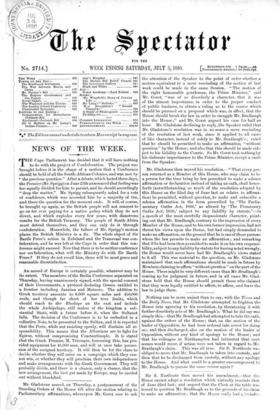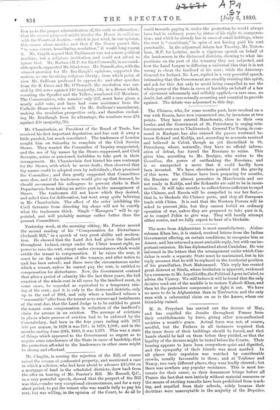Sir S. Nortbcote then moved his amendment,—that the House cannot
adopt a resolution which virtually rescinds that of June 22nd last; and argued that the Clerk at the table was bound to question Mr. Bradlaugh as to the grounds of his claim to make an affirmation ; that the House really had a juriadic-
tion as to the proper administration of the oath or affirmation ; that the course proposed might involve the House in collisions with the Courts of Justice,—which is just what, in our opinion, this course alone avoids ; and that if the House passed this, "to sonic extent, humiliating resolution," it would long repent it. Mr. Smyth argued that Parliament was not a mere political machine, but a religious institution, and could not afford to ignore God. Mr. Borlase (M.P. for East Cornwall), in a remark- able speech, supported Mr. Gladstone. Mr. Parnell, also, with the utmost aversion for Mr. Bradlaugh's opinions, supported the motion, as one involving religious liberty ; from which point of view Mr. Sullivan professed to oppose it; and after speeches from Sir R. Cross and Mr. O'Donnell, the resolution was car- ried by 303 votes against 240 (majority, 54), in a House which, counting the Speaker and the Tellers, numbered 557 Members. The Conservatives, who number only 237, must have given a nearly solid vote, and have had some assistance from the ,Catholic Home-rulers as well. On Mr. Sullivan's amendment, making the resolution prospective only, and therefore exclud- ing Mr. Bradlaugh from its advantage, the numbers were 274 against 236 (majority, 38).



































 Previous page
Previous page